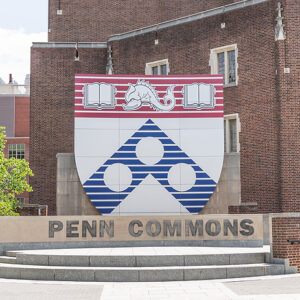University of Pennsylvania President Liz Magill is once again facing criticism for her slow response to antisemitism on campus.
Michael Balaban, president and CEO of the Jewish Federation of Greater Philadelphia, and Jason Holtzman, director of the Jewish Community Relations Council of the Jewish Federation of Greater Philadelphia, sent an open letter to Magill asking her to respond after antisemitic graffiti was found on Oct. 20 at Penn’s Alpha Epsilon Pi (AEPi) chapter house, which is known as a Jewish fraternity.
The graffiti read: “The Jews R Nazis.”
“The University of Pennsylvania’s swift condemnation of this graffiti is needed to show Jewish students that you are committed to ensuring their safety and well-being, especially at a time when it is being threatened nationwide,” the Jewish leaders wrote.

M. Elizabeth “Liz” Magill, president of the University of Pennsylvania.
“While we understand that the University’s Division of Public Safety is still investigating the incident as ’a potential hate crime,’ the wording used is irrefutably antisemitic and therefore deeply painful for Jewish students and their allies to witness.”
“A recent Hillel International survey reported that since the Oct. 7 Hamas terrorist attacks on Israel, 56 percent of Jewish students feel scared on campus, and 1 in 4 report that there has been an act of antisemitic violence or hate on their campus in the last 10 days,” they added.
There have been pro-Hamas demonstrations, including one where a Jewish student was injured, Holtzman said.
“Faculty at Penn have participated in those rallies and promoted them in their classrooms,” said Holtzman. “And that’s unacceptable behavior, too. And I think President Magill needs to show leadership and make it clear that Penn will not tolerate rallies that promote jihad and where Jewish students get assaulted, and Jewish students are told to go back to Berlin, to go back to Poland…That type of rhetoric is unacceptable for a campus or anywhere in our society.”
And, they noted, “The Secure Community Network (SCN) has reported an alarming uptick in antisemitic incidents concentrated on college campuses since Oct. 7. SCN received 94 antisemitic incident reports on college campuses, representing 15 percent of the total 614 antisemitic incidents logged across the country during the month of October.”
“We appreciate your commitment to better supporting Jewish students on Penn’s campus following the Palestine Writes Festival held on campus in September. However, as the university continues to consider its policies to effectively combat antisemitism on campus, we remind you how critical timeliness and consistency are to setting the precedent that antisemitism and hate have no place at Penn. Penn’s statement on this matter is necessary to ensure that Jewish students understand that they have your protection and support on campus,” the letter said.
As of Monday evening, Magill had yet to respond to the federation. And a Penn spokesperson did not reply to DVJournal.
Holtzman told DVJournal he has heard from Penn, Temple, and Drexel students who are afraid on those campuses.
Students have “expressed the real feeling of being under threat and not feeling safe on campus,” said Holtzman. They “are not comfortable speaking Hebrew on campus. They’re not comfortable wearing a Star of David on campus.”
And other students have also stopped wearing the hijab or veil, he said.
“Penn Hillel is horrified by the recent uptick in antisemitism on campuses – including Penn – and in many spaces around the country and world,” said Rabbi Gabe Greenberg, executive director of Penn Hillel. “We will continue to work closely with university leadership to ensure they understand the severity of this issue and that they act upon it to ensure that Jewish students feel safe and secure on campus. We are also in close contact with the students of AEPi so that we understand their needs and can help amplify their voice to the administration.”
When asked if he thought this would be “the new normal,” Holtzman said he hoped it is not a permanent situation.
“But I think it’s very clear that there’s been a great deal of antisemitism existing in our society, in our city for a long time,” said Holtzman. “And it doesn’t take much for people to show the worst of themselves.”
“The truth is that Israel is responding to a terrorist group that invaded their sovereign borders and massacred people, tortured people, raped and kidnapped people,” Holtzman continued. “And Israel is forced to respond to those actions on behalf of Hamas. We saw within less than 24 hours after the attack occurred on Oct. 7, there were protests and rallies already taking place throughout Philadelphia and on and off campus.
“So we know that the people who hold these deeply problematic and bigoted views are here. And it doesn’t take much for them to act.”
Holtzman added, “We have a lot of work to do in terms of education. Israel is not fighting against the Palestinian people, against the Muslim people. Israel is fighting a war against the radical terrorist groups, and had Hamas not done what they did on Oct. 7, there would be no war.”
In Israel, 300,000 people are now homeless, he added.

